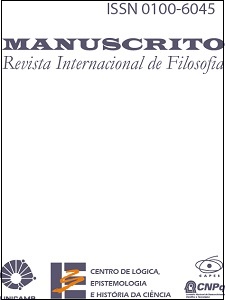Abstract
I first present a few basic notions of philosophical semantics, namely that of linguistic meaning, linguistic understanding, truth-conditions, and What Is Said. I try to show, like contextualists today urge us to, that the distinction between linguistic meaning and What Is Said by a literal utterance of a sentence in a context should not be blurred. The notion of What Is Said, of central importance for contextualism, can be construed as a semantic or a pragmatic notion according to the role played by the notion of speaker meaning in one’s favorite theory. Then I present an overview of three historical approaches in the history of the sciences of language, focusing on the language-thought relation and showing how these notions combine differently. The first is the ideational theory of language, defended by Arnauld and Locke. The second is the classical philosophical semantics developed in the first half of XXth century. The third is today’s contextualism, developed mainly by Travis and Recanati. Here is what the comparison reveals: the “way of ideas” and contextualism agree that the notion of What Is Said should be construed as a pragmatic notion, in opposition to classical philosophical semantics cum the Gricean apparatus.
References
ARISTOTE. De l’Interprétation. Traduction et notes de Jean Tricot. Paris: Vrin, 1966.
ARNAULD, A., NICOLE, P. La Logique ou l’Art de Penser [1683]. Paris: Flammarion, 1970.
ARNAULD, A., NICOLE, P. [1669-1672]. La Grande Perpétuité de la foi de l'Eglise Catholique sur l'Eucharistie [G.P.]. Publiée par l'Abbé M***. Paris: Imprimerie de Migne, chez l'éditeur rue d'Amboise, Horsla barrière d'Enfer, 1841.
AUROUX, S. La Sémiotique des Encyclopédistes. Paris: Payot, 1979.
AUSTIN, J.L. How to Do Things with Words. Cambridge, Mass.: Harvard University Press, 1962.
AUSTIN, J.L. Philosophical Papers. Oxford: Clarendon Press, 1961.
BEZUIDENHOUT, A. “Metaphor and What is Said: A Defense of a Direct Expression View of Metaphor”. Midwest Studies in Philosophy, 25, pp. 156-186, 2000.
BEZUIDENHOUT, A. “Truth-Conditional Pragmatics”. Philosophical Perspectives, 16, pp. 105-134, 2002.
BURGE, T. “Individualism and the Mental”. Midwest Studies in Philosophy, 4, pp. 73-122, 1979.
CAPPELEN, H., LEPORE, E. Insensitive Semantics. A Defense of Semantic Minimalism and Speech Act Pluralism. Oxford: Blackwell, 2005.
CARNAP, R. [1947]. Meaning and Necessity. Chicago: University of Chicago Press, 1956.
CARNAP, R. Introduction to Symbolic Logic and its Applications. New York: Dover Publications Inc., 1958.
COHEN, J. “How Is Conceptual Innovation Possible?”. Erkenntnis, 25, pp. 221-238, 1986.
COLE, P., MORGAN, J. (dir.). Syntax and Semantics, vol. 3. London: Academic Press, 1975.
DAVIDSON, D. Davidson, D. “Truth and Meaning”. In: Synthese, 17, pp. 304-323, 1967; également dans Inquiry into Truth and Interpretation. Oxford: Oxford University Press, 1984.
DOMINICY, M. La Naissance de la grammaire moderne. Bruxelles: Pierre Mardaga, 1984.
FREGE, G. Les Fondements de l’Arithmétique [1884]. Trad. C. Imbert. Paris: Ed. Du Seuil, 1969.
FREGE, G. “Que la science justifie le recours à une idéographie” [1882]. In: Écrits Logiques et Philosophiques. Trad. C. Imbert. Paris: Ed. Du Seuil, 1971.
FREGE, G. The Basic Laws of Arithmetic: Exposition of the System [1893]. University of California Press, 1967.
GOMBRICH, E.H. Art and Illusion: A Study in the Psychology of Pictorial Representation. Princeton University Press, 1960.
GRICE, H.P. “Meaning”. Philosophical Review, 67, pp. 377-388, 1957.
GRICE, H.P. “Logic and Conversation”. In: P. Cole, J. Morgan (dir.). Syntax and Semantics, vol. 3. London: Academic Press, pp. 41-58, 1975.
HALE, B., WRIGHT, C. (dir.). A Companion to the Philosophy of Language. Oxford: Blackwell, 1997.
KEMP, G. “Meaning and Truth-Conditions”. The Philosophical Quarterly, 48(193), pp. 483-493, 1998.
LAHAV, R. “Against Compositionality: The Case of Adjectives”. Philosophical Studies, 57, pp. 261-279, 1989.
LECLERC, A. “Communication, Linguistic Understanding and Minimal Rationality in the Tradition of Universal Grammar”. In: D. Vanderveken (dir.). Logic, Thought and Action. Dordrecht: Springer, pp. 133-150, 2005.
LOCKE, J. Essay Concerning Human Understanding [1690]. New York: Dover Publications Inc., 1959.
MONTMINY, M. “Semantic Content, Truth-Conditions and Context”. Linguistics and Philosophy, 29, pp.1-26, 2006.
MONTAGUE, R. Formal Philosophy. Textes réunis par R. Thomason. New Haven: Yale University Press, 1974.

